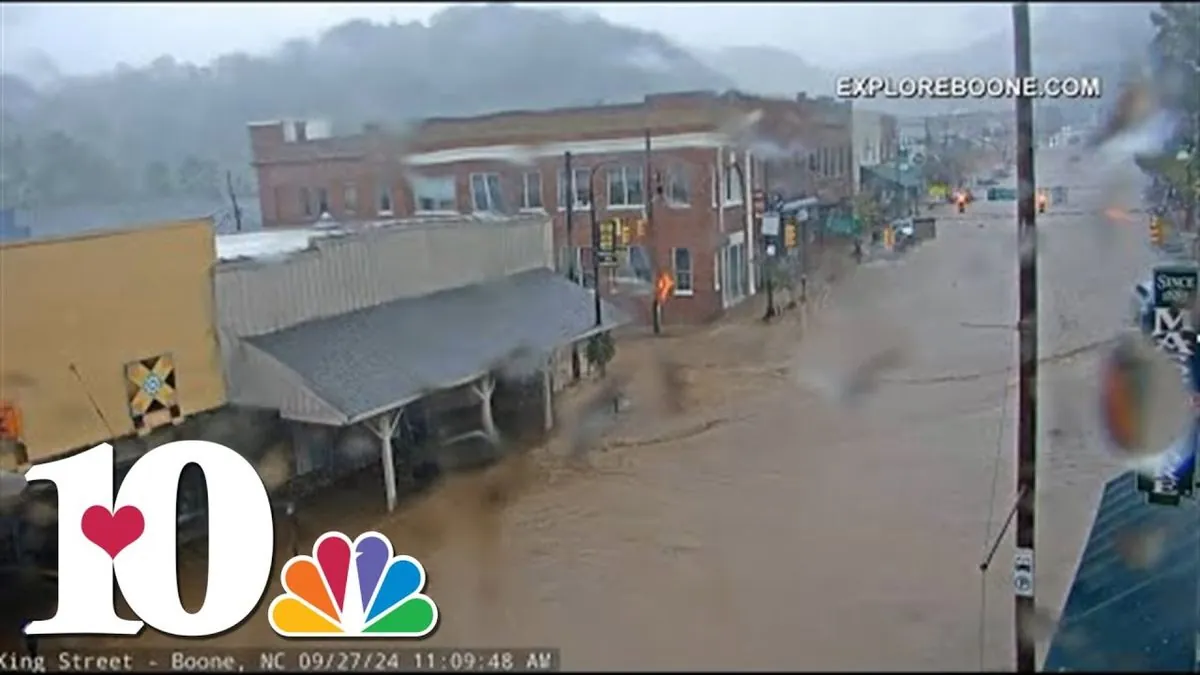In a devastating turn of events, Hurricane Helene has brought unprecedented rainfall and flooding to the mountainous regions of North Carolina, catching residents off guard and leaving a trail of destruction in its wake. The storm, which made landfall on Florida's Panhandle, traveled hundreds of miles inland, causing what experts describe as a once-in-a-generation deluge in the picturesque Blue Ridge Mountains.
The Dixon family of Swannanoa, a small community near Asheville, found themselves at the center of this catastrophe. Jessica Dixon, 40, recounted the harrowing experience that claimed her father's life and nearly cost her entire family their own. As Bee Tree Creek, typically a serene waterway behind their home, transformed into a raging torrent, the family's world was turned upside down in a matter of minutes.
"Dad went to the back to grab my mom's purse where the keys were attached. Then, all I could hear was Parker saying, 'Grandpa's gone. Grandpa's gone.' And he was washed away."
The sudden and violent nature of the flood left the family with no time to escape. George Dixon, Jessica's father, was swept away by the powerful currents while attempting to retrieve car keys, a heartbreaking loss just days before what would have been his 50th wedding anniversary.
As the floodwaters rose to chest level, the remaining family members – including Jessica's mother Jill, and her two teenage sons, Parker and wheelchair-bound Kaden – found themselves fighting for survival. In a desperate bid to stay afloat, they clung to a large leather guitar case and a dresser for six to seven hours as contaminated water from a flooded septic tank filled their home.
The Dixon family's ordeal is just one of many tragic stories emerging from the Asheville area, where Hurricane Helene's impact has been severe and far-reaching. The storm has destroyed roads and bridges, cut off water and power supplies, and claimed dozens of lives, leaving thousands of residents in shock and disbelief.
This catastrophic event highlights the increasing vulnerability of mountain communities to extreme weather events. The Blue Ridge Mountains, known for their biodiversity and scenic beauty, are now facing unprecedented challenges due to climate change. The region's unique topography, combined with rapid urbanization in mountain valleys, has exacerbated flood risks, making emergency preparedness more crucial than ever.
As the floodwaters receded, Jessica made the heartbreaking discovery of her father's body downstream, caught in debris and fallen trees. Law enforcement officials later confirmed retrieving the body of a man matching George Dixon's description on September 29, 2024.
The aftermath of Hurricane Helene serves as a stark reminder of the importance of flood-resistant construction techniques and comprehensive disaster preparedness in vulnerable areas. As communities in the Asheville region begin the long process of recovery and rebuilding, the focus must shift towards creating more resilient infrastructure and improving early warning systems to prevent future tragedies.
The Dixon family's story of survival against overwhelming odds – clinging to a guitar case that Jessica credits with saving their lives – stands as a testament to human resilience in the face of nature's fury. As the region grapples with the aftermath of this devastating event, the need for long-term solutions to protect mountain communities from extreme weather becomes ever more apparent.
